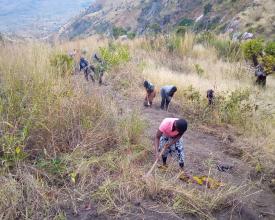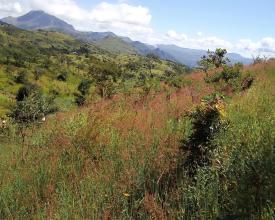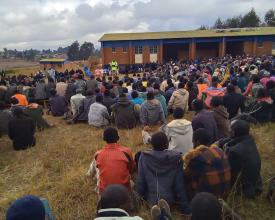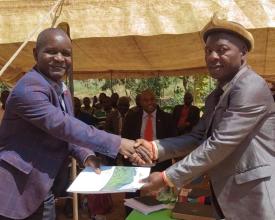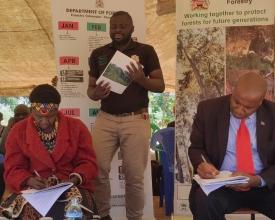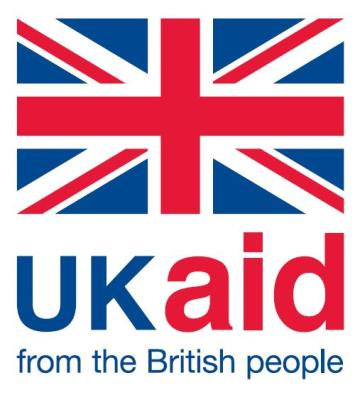Restoring degraded forests through ANR
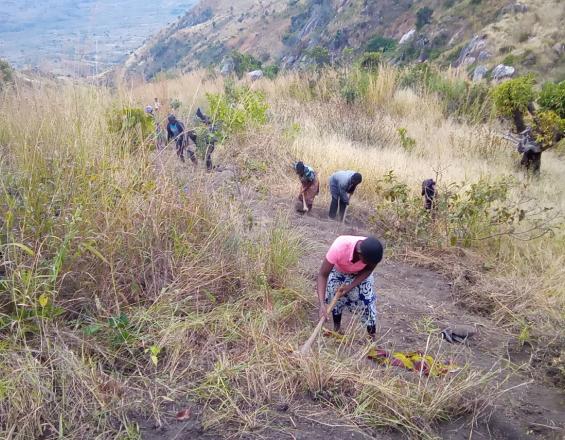
In support of the Government of Malawi's National Forestry Landscape Restoration Strategy, and the Dedza District Council's FLR Action Plan, the Department of Forestry (DoF), with support from Modern Cooking for Healthy Forests activity has engaged local communities using data (e.g., from the National FLR Assessment, the National Forest Inventory, and the Deforestation Assessment) to prioritize degradation hotspots in selected Forest Reserves and adjacent landscapes. The degradation hotspots are focal points for "restoration" interventions--including a number of hotspots in/around the Mua- Livulezi Forest Reserve.
Context
Challenges addressed
Between 2000 and 2020 the Mua-Livulezi Forest Reserve was extensively deforested and degraded, primarily by illegal and unsustainable charcoal production for the capital city of Lilongwe (and other nearby peri-urban areas). In addition, after some areas were deforested for years community members encroached and began opening new farms within the protected area. Repeated fires associated with agricultural land preparation/clearing had a negative impact on regeneration. Downstream communities experienced soil erosion leading to loss of soil fertility, declining crop production, and increasing frequent periods of food insecurity.
Location
Process
Summary of the process
Strong local leadership is essential to catalyze support for implementation. However, feedback and evidence of implementation are important to demonstrate progress, and to keep actors engaged. When the TA led the efforts to remove encroachers this "action" incentivized others engaged in the FCM agreement to be accountable and do their part.
Building Blocks
Capitalizing on strong local leadership and partnerships with government and others
The following building blocks have contributed to the success of the restoration realized to date.
- Strong local leadership: Strong leadership by the Traditional Authorities and local committees facilitated participation, engagement, and buy-in.
- Partnership with government departments: The GoM delivers timely training and support
- Partnership with local and international NGOs.
The organization supported beneficiaries with resources including data, training/capacity building, and in some cases tools.
Enabling factors
The factors that enabled success to date included building on the recognition that local leaders are the most trusted agents of development. Without the buy-in and strong leadership of the Traditional Authority (and his Group Village Headmen), getting the buy-in of the communities would have been extremely difficult, if not impossible.
Lesson learned
Lessons learned to date include:
- Information, awareness, and advocacy are critical to community-led problem identification and problem-solving, and are prerequisites to community participation in "solutions".
- Community participation in development work results in less costs in the implementation of activities.
- Partnerships and collaboration with District Council and the Area Development Committee, and with non-governmental organizations are key to sourcing required technical support e.g., ANR and firebreak construction.
Resources
Accountability is key to governance and management
In an effort to promote improved governance and management, the DoF and MCHF supported the development of a tripartite forest co-management agreement between the DoF, the District Council, and the local communities (represented by the TAs). Roles and responsibilities--including specific roles and commitments from supporting actors (including Malawi Police Service, Ministry of Justice, etc.) help stakeholders to hold one another accountable.
Enabling factors
The forest-co-management agreement has been informed by a forest management plan, developed with data from the NFI and from a series of community consultations. This also resulted ion the identification and prioritization of degradation/restoration hotspots.
Lesson learned
Evidence of implementation is important to incentivize and motivate partners to continue investing in forest co-management
Impacts
Subsets of the degradation hotspots (termed degradation/restoration hotspots) were "treated" by communities with firebreaks and ANR, after training delivered by the Department of Forestry (DoF) and the MCHF project. As Malawi transitions to the dry season, there has been a decrease in damaging fire incidents within treated degradation/restoration hotspots. Additionally, regeneration in treated areas is visibly progressing faster than in adjacent untreated sections of the degradation hotspots--demonstrating the potential of the forest for its ecological functionality (and helping to inform the business case for ANR). From 2021 to date a total of 450 hectares have been put under restoration.
In addition, it is worth noting that more and more people are now involved in restoration activities, perhaps reflecting the quality of engagement/sensitization, and the perceived benefits of restoring key ecological functions that benefit those restoring the degraded areas.
Beneficiaries
- Nadzikhale Block Management Committee (BMC)
- Ngonoonda BMC
- Kamenya Gwaza BMC
- Kadzungu BMC
Sustainable Development Goals
Story
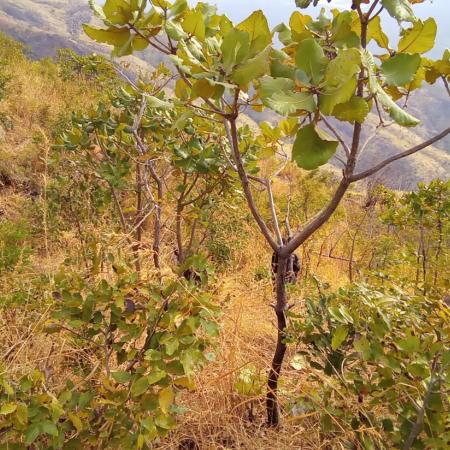
As mentioned above, in some parts of the reserve, after clearing for charcoal individuals moved in to open farm areas. As a result of multiple years with less than normal rainfall, and periods of intense rains and flooding, more people encroached on the reserve to farm on virgin land. This left parts of the reserve bare, leading to increased runoff, downstream soil erosion, loss of soil fertility, and declining agricultural productivity (and increasing food security).
In 2020, the Government of Malawi with support from USAID and UKaid co-funded Modern cooking for Healthy Forest (MCHF) and began raising awareness of communities on the downstream impacts of deforestation and degradation. Shortly thereafter the partners began delivering training to communities in Traditional Authority Kamenya Gwaza on assisted natural regeneration and fire prevention and management. Community members are organized into BMCs, with the aim of implementing FLR activities in the identified degradation hotspots. these BMCs have continued to implement restoration activities within these hotspots. One of the first activities that the BMCs implemented was to sensitize encroachers of the protected reserve on the impacts of forest land degradation. The efforts led to 60% of the encroachers moving out of the protected area. Later, the Traditional Authority organized to have the remaining encroachers removed from the FR. The areas which have been cleared and farmed remained as "fallow" in 2021, however, regenerants began to reappear and the BMCs have conducted ANR and fire prevention in these areas.
